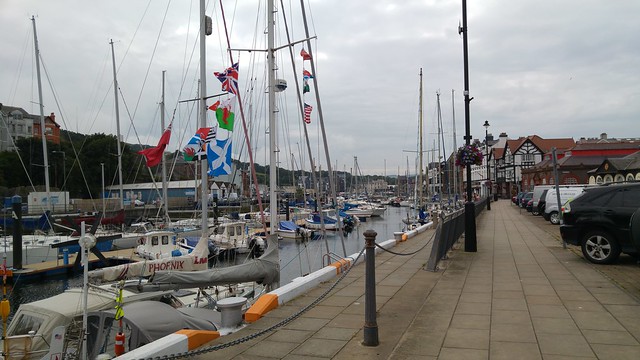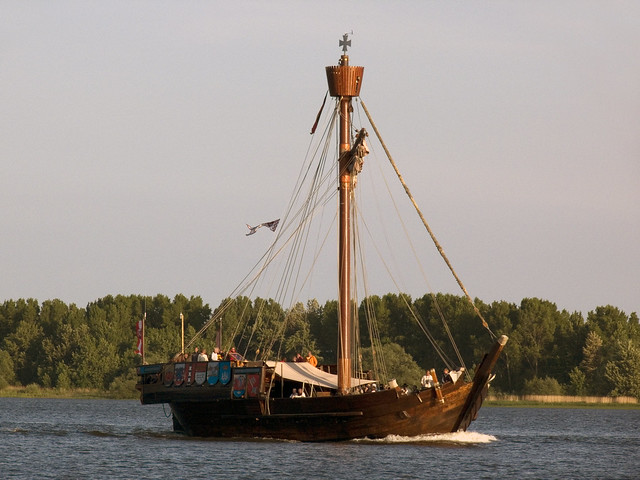Words for rope, cord, string and related things in Celtic languages.

Words marked with a * are reconstructions.
| Proto-Celtic |
*tantus, *tantā = cord, string |
| Old Irish (Goídelc) |
tét [tʲeːd] = cord, rope, string |
| Middle Irish (Gaoidhealg) |
tét, téd, tet [tʲeːd] = rope, cord, string, a spider’s thread
tétaire = harper, lute-player
tétán = rope, cord
téitimnech = the crack, creaking of the ropes |
| Irish (Gaeilge) |
téad [tʲiad̪ˠ/tʲeːd̪ˠ] = rope, cable, string, chord, tether
téadach = stringed
téadaire = roper, corder, player of stringed instrument
téadaireacht = (act of) playing on stringed instrument
téadán = short rope, string, cord, line
téadchleasaí = rope-walker, rope-dancer
téadleimneach = (act of) skipping
téadra = cordage |
| Scottish Gaelic (Gàidhlig) |
teud [tʲiad] = cord, string
teudach [tʲiadəx] = stringed
teudachadh [tʲiədəxəɣ] = (act of) stringing, tethering
teudag [tʲiədag] = little string/cord, fibre
teudagach [tʲiədagəx] = fibrous, fibery, abounding in fibres
teudaichte [tʲiadɪçdʲə] = stringed, tethered |
| Manx (Gaelg) |
tead, tedd, teidd = rope, string, line, guy
teaddey = rope
teaddaght = cordage |
| Proto-Brythonic |
*tant = string (?) |
| Old Welsh (Kembraec) |
tantou = string |
| Middle Welsh (Kymraec) |
tant = string, line, cord, tendril
tennyn = tether, leash, lead, halter, string, cord, rope, noose, snare |
| Welsh (Cymraeg) |
tant [tant] = string (of a musical instrument), line, cord, tendril, bowstring, nerve, sinew, tendon
tantio = to string (a musical instrument)
tantiwr = fisherman who stands on the shore holding one end of a salmon net, while two others throw the net into the water from a boat
tantor = player of stringed instruments, harpist
tennyn = tether, leash, lead, halter, string, cord, rope, noose, snare |
| Old Breton (Brethonoc) |
tantou = strings |
| Middle Breton (Brezonec) |
tant = string |
| Breton (Brezhoneg) |
tant [tãnt] = string |
Etymology: from Proto-Indo-European *tén-tu-s/ *tn̥-téw-s, from *ten- (to stretch, extend) [source]. Words from the same PIE roots include: ndej (to stretch) in Albanian, tenet (an opinion, belief, principle) in English, dehnen (to stretch) in German, tenere (to hold, keep, sustain) in Italian, tit (to wind, reel, coil, wrap) in Latvian, tener (to have, possess, hold, grasp) in Spanish, and tänja (to stretch, bend) in Swedish [source].
| Proto-Celtic |
*lomanā = rope, thong |
| Old Irish (Gaídelc) |
loman = cord, rope |
| Middle Irish (Gaoidhealg) |
loman, lomna = cord, rope, thong, string, leash, bridle, halter |
| Irish (Gaeilge) |
lomhain = rope, halter, leash |
| Scottish Gaelic (Gàidhlig) |
lomhainn [l̪ˠõ.ɪn̪ʲ] = leash, lead, pack, band, gang |
| Manx (Gaelg) |
louyn = rope
er louyn = along, by hand, on a rope |
| Proto-Brythonic |
*lloβ̃an [be̝ˈrɨːd] = rope, string |
| Middle Welsh (Kymraec) |
llyfan = string, cord, thin rope |
| Welsh (Cymraeg) |
llyfan = string, cord, thin rope |
| Middle Cornish (Cernewec) |
lovan = rope, cord, string
lovannan = a small rope, cord |
| Cornish (Kernewek) |
lovan = rope, lasso
lovan dynn/dydn = tightrope
lovan lemmel = skipping rope |
| Middle Breton |
louffan = strap, belt |
| Breton (Brezhoneg) |
louan [ˈluːãn] = strap, belt
louaneg = slender (long-legged), clumsy
louangen = skinny, without energy |
Etymology: unknown, possibly from a non-Indo-European substrate language [source].
| Proto-Celtic |
*souggo = (?) |
| Middle Irish (Gaoidhealg) |
súagán, súgán = (straw) rope |
| Irish (Gaeilge) |
súgán = (straw) rope, strawmat, lifeless, inert, spinless person
súgánach = confused |
| Scottish Gaelic (Gàidhlig) |
sùgan [suːgan] = straw rope, horse’s collar (filled with straw) |
| Manx (Gaelg) |
suggane = twisted straw rope |
Etymology: from Proto-Indo-European *sew- (to bend, cut). The Scots word suggan (light saddle, bedroll), and the Hiberno-English word sugan (a wooden chair with a seat made from woven straw or twine stretched over the frame) both come from the same roots via Irish, as does the word soogan (a bedroll) in American English [source].
| Old Irish (Goídelc) |
súainem = cord, rope, string, thong |
| Middle Irish (Gaoidhealg) |
súainem, súaineamh, súainimh = cord, rope, string, thong, course (of river) |
| Irish (Gaeilge) |
suaineamh = (javelin) cord, amentum (catkin) (literary) |
| Scottish Gaelic (Gàidhlig) |
sìoman [ʃiəman] = simmen, rope made from plant fibres (esp. straw, but also coir, heather, grass, twigs or rushes) |
| Manx (Gaelg) |
saineen = cord, thong |
Etymology: from Old Norse síma (cord, rope) [source], from Proto-Germanic *sīmô (rope, cord), from Proto-Indo-European *sh₂éy-mn̥/*sh₂i-mén-s, from *sh₂ey- (to bind, fetter) [source].
| Middle Irish (Gaoidhealg) |
róp = rope |
| Irish (Gaeilge) |
rópa [ˈɾˠoːpˠə]= rope
rópa = rope
rópadóir = rope-maker
rópadóireacht = rope-making, rope-walking, rope-climbing, working with ropes |
| Scottish Gaelic (Gàidhlig) |
ròp, ròpa [r̪ˠɔːhbə] = rope, bundle of seaweed
ròpach [r̪ˠɔːhbəx] = abounding in ropes, tangled up, jumbled, untidy, messed up, abounding in tall tales/yarns
ròpadh [r̪ˠɔːhbəɣ] = (act of)roping, fastening with a rope, entangling
ròpair [r̪ˠɔːhbɛrʲ] = auctioneer
ròpaireachd [̪rˠɔːbɛrʲəxg] = exaggerated tale, exaggerating, adorning the truth |
| Middle Welsh (Kymraec) |
raff, raf = rope, cord, string, line, cable, noose, halter
reffyn, rheffyn = (small) rope, cord, string, (fishing) line, cable, noose, halter |
| Welsh (Cymraeg) |
rhaff = rope, cord, string, line, cable, noose, halter
rhaffu, rhaff(i)o = to tie with a rope or cord, to rope, fix a rop on, make a rope, to string or join (words, etc), connect together, link, crumple, spoil, waste, eat eagerly, gobble, snatch
rhaff(i)aid = rope(ful), that which is held by a rope
rhaffol = roped, made of rope(s), funicular
rhaffwr, rhaffydd = rope-maker
rheffyn = (small) rope, cord, string, (fishing) line, cable, noose, halter |
Etymology: from Middle English rop(e) (rope), from Old English rāp (rope, cord, cable), from Proto-West-Germanic *raip (string, band), from Proto-Germanic *raipaz (rope, cord, band, ringlet), possibly from Proto-Indo-European *h₁royp-nó-s (band, strip, strap) [source]. The Welsh words are probably cognate, but their origins are not certain.
| Middle Irish (Gaoidhealg) |
corda = cord, rope |
| Irish (Gaeilge) |
corda = cord, string, chord
cordach = chordate, corded
cordaigh = to cord |
| Scottish Gaelic (Gàidhlig) |
còrd = cord, chord |
| Manx (Gaelg) |
coard, coyrd, coyrdey = cord |
| Middle Welsh (Kymraec) |
kord = cord, string, small rope, halter
cort = cord, string, twine, rope |
| Welsh (Cymraeg) |
cord = cord, string, small rope, halter
cort = cord, string, twine, rope
cortio = to cord, fasten with cords or strings, twist |
| Middle Cornish (Cernewec) |
cord = cord
corden = string |
| Cornish (Kernewek) |
korden = cord, string
korden an keyn = spinal cord |
| Middle Breton (Brezonec) |
corden, cordenn, querdenn, querdeynn = rope
cordenner = tailpiece |
| Breton (Brezhoneg) |
kordenn [ˈkɔr.dɛn] = rope
kordennan = to rope, fish with longlines
kordenner = tailpiece
kordennerezh = ropework
kordennig = cord, string |
Etymology (Breton): from Middle French corde (rope), from Old French corde (rope), from Latin chorda (tripe, intestine, catgut, string, rope, cord), from Ancient Greek χορδή (khordḗ, string of gut, chord, sausage, black pudding), from Proto-Indo-European *ǵʰerH- (bowel) [source].
Etymology (other languages): from Middle English corde (cord, string, sinew), from Old French corde (rope), from Latin chorda (tripe, intestine, catgut, string, rope, cord), from Ancient Greek χορδή (khordḗ, string of gut, chord, sausage, black pudding), from Proto-Indo-European *ǵʰerH- (bowel)[source].
Words from the same roots include cord, chord, hernia and yarn in English, corda (rope, chord, string) in Italian, and koord (rope, cord) in Dutch [source].

Sources: Wiktionary, Etymological Dictionary Of Proto Celtic, In Dúil Bélrai English – Old Irish glossary, eDIL – Electronic Dictionary of the Irish Language, Teanglann.ie, Am Faclair Beag, An etymological dictionary of the Gaelic language, Fockleyreen: Manx – English Dictionary, Online Manx Dictionary, Gaelg Corpus, Geiriadur Prifysgol Cymru, Lexicon cornu-britannicum : a dictionary of the ancient Celtic language of Cornwall, Gerlyver Kernewek, Devri : Le dictionaire diachronique du breton, Dictionnaires bilingues de Francis Favereau / Edition Skol Vreizh, TermOfis













